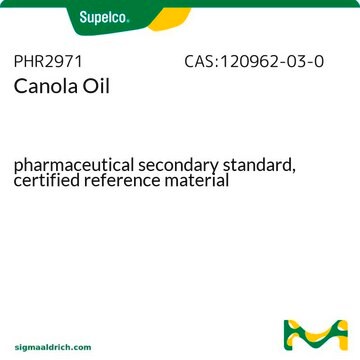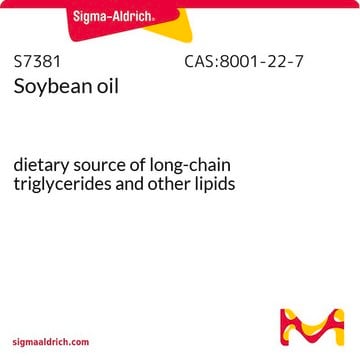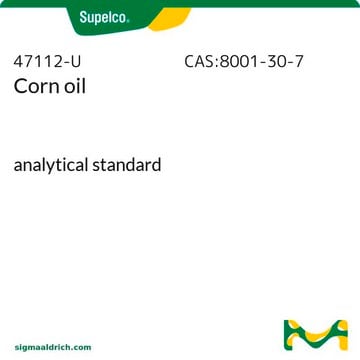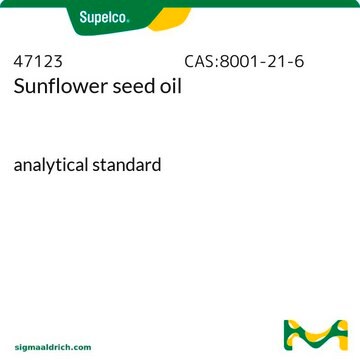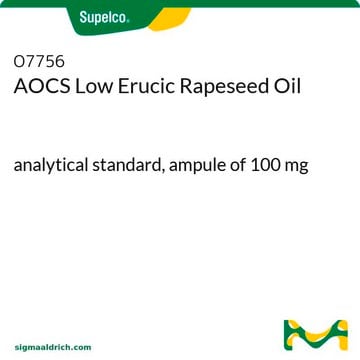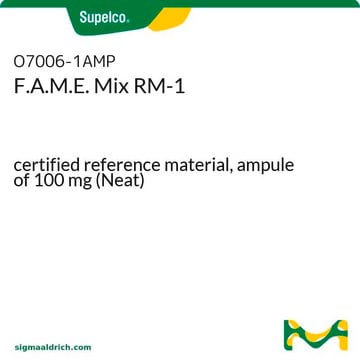46961
Canola oil
analytical standard
Sinonimo/i:
Rapeseed oil
Autenticatiper visualizzare i prezzi riservati alla tua organizzazione & contrattuali
About This Item
Prodotti consigliati
Grado
analytical standard
CdA
current certificate can be downloaded
Confezionamento
ampule of 1000 mg
tecniche
HPLC: suitable
gas chromatography (GC): suitable
applicazioni
food and beverages
Formato
neat
Temperatura di conservazione
2-30°C
Cerchi prodotti simili? Visita Guida al confronto tra prodotti
Descrizione generale
Characterized canola oil samples are available for use as controls or check samples for fatty acid methyl ester (FAME) analyses. These reference materials can be used as qualitative standards. They provide an excellent means of standardizing the lipid procedures and comparing the results to others. Packed in an amber ampule under nitrogen. A Certificate of Composition, which includes the chromatographic fingerprint analysis, is provided with the oil sample.
Applicazioni
Refer to the product′s Certificate of Analysis for more information on a suitable instrument technique. Contact Technical Service for further support.
Codice della classe di stoccaggio
10 - Combustible liquids
Classe di pericolosità dell'acqua (WGK)
WGK 3
Punto d’infiammabilità (°F)
Not applicable
Punto d’infiammabilità (°C)
Not applicable
Dispositivi di protezione individuale
Eyeshields, Gloves
Scegli una delle versioni più recenti:
Possiedi già questo prodotto?
I documenti relativi ai prodotti acquistati recentemente sono disponibili nell’Archivio dei documenti.
I clienti hanno visto anche
Laziz Bouzidi et al.
Food & function, 4(1), 130-143 (2012-10-17)
Pure saturated triacylglycerols (TAGs) in canola oil were used as model systems to analyse oil loss in structured oil both from thermodynamic and kinetic perspectives. Two important parameters which effectively and predictively measure the relative propensity of a solid network
Ask the doctor. I use a lot of canola oil in cooking, because it's heart-healthy. My husband has prostate cancer, and I just heard that canola oil might make it worse. Is that really true and should I stop using it for cooking?
Anthony L Komaroff
Harvard health letter, 37(11), 2-2 (2012-10-19)
Cengizhan Yigitler et al.
Clinics (Sao Paulo, Brazil), 67(11), 1303-1308 (2012-11-28)
Postsurgical abdominal adhesions are common, serious postoperative complications. The present study compared the usefulness of 4% icodextrin and canola oil in preventing postoperative peritoneal adhesions. Twenty-four Wistar albino rats were divided into three groups. Following a laparotomy, a serosal abrasion
Jiang Jiang et al.
Meat science, 93(3), 469-476 (2013-01-01)
Alkali (pH(12)) and acid (pH(1.5)) pH-treated soy protein isolates (SPI) were incorporated (0.25-0.75% protein) into sols of myofibrillar protein (MP, 3%, in 0.6 M NaCl at pH 6.25) with or without 0.1% microbial transglutaminase (TG) to investigate the potential as
Nagao Totani et al.
Journal of oleo science, 61(11), 601-607 (2012-11-10)
We reported previously that in oils used for frying by commercial establishments, a high correlation was observed among their Gardner colors, polar compound contents (PC), carbonyl values (CV) and acid values (AV). However, this was not true for frying oils
Il team dei nostri ricercatori vanta grande esperienza in tutte le aree della ricerca quali Life Science, scienza dei materiali, sintesi chimica, cromatografia, discipline analitiche, ecc..
Contatta l'Assistenza Tecnica.
